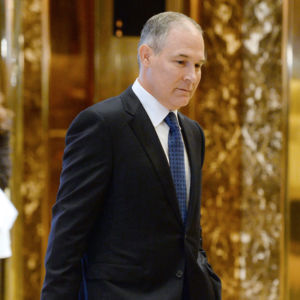Less than three weeks after Donald Trump moved into the White House, civil servants across the federal government are gearing up to go to war with their own president.
In the days after the inauguration, the bureaucratic uprising was limited to the great “Twitter rebellion,” a half-joking campaign cheered on by much of the mainstream press. Then-acting Attorney General Sally Yates took matters up a few notches by refusing to defend the administration’s executive order banning travelers from seven Muslim-majority countries.
The Trump administration promptly sacked Yates, as is the president’s prerogative and which Yates surely knew would be the outcome of her decision. The move has made her a martyr among congressional Democrats and the anti-Trump coalition, although her post-government prospects in the private sector have just gone through the roof.
Her actions, however, raise a far more important question: after eight years in which Barack Obama’s White House had federal agencies take over from Congress in making laws, have those agencies now taken on a mind of their own?
Answering that question requires a look back at the last eight years. Faced with what they saw as intransigent, obstructionist Republican majorities in Congress, Obama’s team opted for an approach that aggressively pushed the limits of executive authority and skirted legislative oversight. Over loud objections from the GOP, the Obama administration used this method to unilaterally push through immigration policies like Deferred Action for Childhood Arrivals (DACA) and sign international treaties such as the Paris climate agreement without Senate consent.
This style of governance empowered individual agencies to make their own rules, and some of Obama’s appointees took full advantage of the opportunity.
Eric Holder, for example, used his powers as attorney general to pursue Democratic priorities and saw himself as a civil rights activist in the mold of Robert Kennedy. In pursuit of that legacy, he defended same-sex marriage and imposed more lenient sentences in non-violent criminal cases, pushing for a greater emphasis on rehabilitation.
At times, this legacy-building meant ignoring or defying Supreme Court rulings on voter identification laws and school vouchers. Then again, Holder wasn’t always so high-minded: he made history as the first Cabinet member to land himself in contempt of Congress over “Operation Fast and Furious.”
That activist streak permeated several agencies under Obama’s watch, with perhaps no better example than the Environmental Protection Agency. Obama’s EPA became the primary vehicle for implementing regulations like the Clean Power Plan without asking Congress for a vote.
Trump’s EPA nominee, Scott Pruitt, raised this point repeatedly during his confirmation hearing, rejecting the idea that the agency should be in the business of making environmental rules and promising to refocus on its executive mission. That, unsurprisingly, rankled Democrats. In one telling exchange, Sen. Bernie Sanders tried to pin Pruitt down on his personal opinions and mocked him when the nominee (rightly) said they were irrelevant.
As congressional leaders such as Jason Chaffetz of Utah have argued for months, climate change was not the only policy area where the EPA saw itself as partisan judge, jury and executioner. Chaffetz is investigating the EPA over links to the France-based International Agency for Research on Cancer, or IARC, which receives U.S. taxpayer funding and has been the subject of controversies over its methodology and findings.
The latter is suspected of working behind the scenes with EPA staff to undermine safety reviews for products like the herbicide glyphosate, which IARC considers to be a cancer risk despite a global regulatory consensus that says otherwise.
The EPA’s handling of the inquiries has fed these rumors: while it refuses to finalize a verdict published back in May, IARC has pressured the American scientists and government employees not to respond to congressional requests for records. The EPA was able to rely on the Obama administration for political cover up until now, but there is no telling what will happen under the new administration.
After eight years in which the Civil Service was trained to see congressional Republicans as the enemy, perhaps we shouldn’t be surprised to see such a hostile response to President Trump. The “rogue” Twitter accounts were tame enough, with purported National Park Service employees in Washington state, California and South Dakota sending out climate change messages and other snarky science tweets.
In the span of less than a week, however, matters have escalated to the point where hundreds of career employees at the State Department have taken openly to criticizing White House decisions. The move made by Yates is just the latest example of agency-level mutiny, and the fact that she was an Obama-era holdover only paints her decision in a partisan light.
This hostile reaction from the bureaucracy has been egged on in large part by a narrative of “resistance” that drowns out productive discourse. One example was the widely reported news that Trump had imposed a “gag order” on numerous government agencies including the EPA, prohibiting them from releasing information to the press pending Pruitt’s confirmation. The move has been presented as the Trump administration “censoring” agencies, even though it is an established precedent for the incoming team to ask for time to review what agencies are communicating to the public.
In the outrage, Trump’s critics have apparently forgotten that Obama imposed a gag order at the beginning of his own presidency, prohibiting federal officials from speaking to the press and even signing an executive order declaring his authority to “supervise, control and correct employees’ communications with the Congress.”
What the administration’s critics fail to realize is that their immediate rejection of the new president proves his point about the unaccountable elites. Instead of giving the man voters elected a chance to govern, both the bureaucracy and the press have written him off as an authoritarian and opted for a stance of total “resistance,” disproving any notion that the government still answers to the will of the people.
There may be a way to restore the public’s faith in Washington, but this isn’t it.

